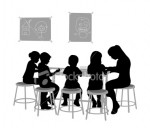Archive for June 27th, 2010
Good Ted Talks Speech: College Begins In Kindergarten
 What’s the right time to start thinking about your kid’s college education? It’s the age old question that every parent thinks about. Some parents don’t think too much about it until high school when college is just a few years away. Others start sooner. They give their kids tutors and putting them in honors and AP courses in middle school or in junior high. And they do what they can to ensure that they get every opportunity to make it to college. And another group, goes even further. They push their kids are far as possible as early as possible, and they negotiate the world of education as early as kindergarten, in hopes that they can negotiate their kids academic future all the way to the top. But which one of these is really the best approach?
What’s the right time to start thinking about your kid’s college education? It’s the age old question that every parent thinks about. Some parents don’t think too much about it until high school when college is just a few years away. Others start sooner. They give their kids tutors and putting them in honors and AP courses in middle school or in junior high. And they do what they can to ensure that they get every opportunity to make it to college. And another group, goes even further. They push their kids are far as possible as early as possible, and they negotiate the world of education as early as kindergarten, in hopes that they can negotiate their kids academic future all the way to the top. But which one of these is really the best approach?
On one hand, thinking about college as your child starts kindergarten is probably useful. Studies show that early preparation builds the foundation of skills needed to be successful in college. It also shows that kids who are socialized earlier and start reading and writing earlier, tend to be not only perform better but also have the intrinsic motivation to keep doing well over the longer term. On the other hand, though, some people today have taken that concept a bit far, putting kids in a high pressure environments and pushing them to get all A’s before grades even matter. And in many of these cases parents end up helping with homework and getting frustrated if they don’t destroying that very motivation that may have existed.
In my view, I suspect there may not be one size fits all approach and that the actual decision depends on context. Context of the kids and family, of the school zone they might be in, and of the socio-economic upbringing of the family. And in a recent Ted talks video, Ken Robinson gives his opinion on this dilemma. For anyone interested in education, I highly recommend checking it out.
In sum, Ken Robinson’s 2010 Ted Talks speech is a funny yet stimulating follow-up to his first talk in 2006. Ken makes the case for a radical shift from standardized schools, from something more industrial and narrow to a more personalized environment that creates conditions where kids’ natural talents can flourish. He also talks about passion, and how we need to feed the spirits and energies of kids who have diverse talents.
In my view both of these are great videos, touching on one of the most important issues of our time – education. And it’s especially interesting for many of us who’ve had the good fortune of attending top schools, where many of us may have had classmates that were forced to major in certain subjects. I personally know a couple of people who were forced to study engineering or medicine because that’s what their parents wanted them to do. And the consequences of not studying those subjects was not having parents pay for tuition, and in some cases, getting negative treatment at home altogether.
Don’t get me wrong, engineering and medicine are incredible professions and highly rewarding for those who undertake them. Not only because they provide a great standard of living but also because they are intellectually challenging, provide a service to the community, and add real value to society. On the other hand though, being forced into any profession, noble or not, tends not to be the best use of talent, especially today in our complex interconnected society, where so many opportunities for innovation exist. But there’s also merit to the competing argument that an 18 year old student, entering college isn’t always equipped to make that decision. As I said before, I don’t know the right approach.
But here’s what I do know. I know that having a diverse talent pool is critical to the advancement of our society. That our human community working together is stronger when it’s diverse and when its people are engaged. Because that way, they can create new things, become more innovative, and steer our society toward new heights, not only economically but also socially and culturally. And in the end, if we not only diversify the talent pool, but if people are also in roles that they are passionate about and that uses all of their best skills, then the odds are much better that we will come up with solutions to the world’s biggest problems.
—
Here are links to both of Robinson Ted Talks speeches and brief descriptions on each:
1. Click here for his 2010 Talk on named “Bring on The Learning Revolution.”
“In this poignant, funny follow-up to his fabled 2006 talk, Sir Ken Robinson makes the case for a radical shift from standardized schools to personalized learning — creating conditions where kids’ natural talents can flourish.”
2. Click Here for his 2006 Talk named “Schools Kill Creativity.”
“Sir Ken Robinson makes an entertaining and profoundly moving case for creating an education system that nurtures (rather than undermines) creativity.”






